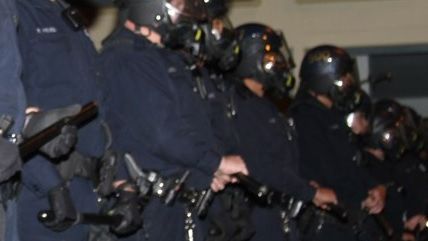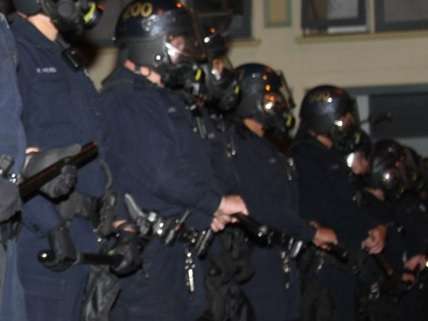'Movement for Black Lives' Releases Agenda in Attempt to Hijack Black Lives Matter/Police Reform Movement
"Ooh, people are interested in an issue? Here's a list of the things I always wanted"


Two years after efforts to reduce police violence began to be grouped under the "Black Lives Matter" banner, organizations that have also attached themselves to the banner are appropriating it for their own sectarian agendas. More than 50 political groups operating under the "Movement for Black Lives" (MBL) banner (which outlets like Vox.com appear to be trying to imply is another way to say 'Black Lives Matter' and not a new grouping) have released an "agenda" that's only tangentially related to the issue of police violence. The agenda consists of standard left to far-left policy planks—things like re-instating Glass-Steagal, reparations, getting rid of body cameras, and even supporting boycotts of Israel.
Unfortunately, this agenda appears to be getting more play than Campaign Zero, an initiative launched by several leaders of Black Lives Matter a year ago that offered a number of policy proposals meant specifically to address the issue of police violence. Outlets like Time magazine incorrectly describe the MBL's agenda as the "first time" Black Lives Matter has released an agenda—Reuters similarly incorrectly called the MBL agenda a "first" Outlets like Fusion called it "unprecedented" when it wasn't. The coverage of the MBL agenda suggests many reporters who cover Black Lives Matter were unaware of Campaign Zero. The MBL agenda has the effect of making black lives "matter less" by marginalizing the issue of police violence which has captured the attention of the nation in favor of a pre-existing sectarian, far-left agenda that was not created specifically to reduce police violence and which, through its demand for more government power, could actually increase it.
I spoke with one member of the Congressional Black Caucus at the DNC last week who told me he'd never heard of Campaign Zero and was surprised that a movement defined largely on street action had a serious policy agenda. They do, but it's not the one released by the MBL. Campaign Zero's policy platforms include ending broken windows policing, more community oversight, limiting the use of force, independent investigations and prosecutions, community representation, body cameras, new training, an end to asset forfeiture and for-profit policing, demilitarization, and fair police union contracts—policies that can variously be implemented at the local, state, or federal levels and that address specific issues that contribute directly to the problem of police violence. But Campaign Zero will only be effective if more people push more politicians to take it seriously. The far-left agenda of the MBL, instead, discourages coalition-building and works against the idea that a Black Lives Matter agenda can find broad support. Campaign Zero has a candidate tracker for the presidential election. It's a shame more of the candidates don't support more of the platform, and that Gary Johnson doesn't appear at all, but a big part of that falls on the activists themselves too. When Black Lives Matter protesters were asked by Hillary Clinton what they wanted, they did not articulate the proposals of Campaign Zero. Now MBL has offered an agenda that will make it easy for politicians to dismiss.
The MBL's attempt to attach their agenda to the police reform movement would be the equivalent of offering up the idea of dismantling government, and the policy proposals to make it happen, as a solution. There's, of course, a powerful argument to be made that government is the greatest oppressor and does the most damage to marginalized people. But it would be unhelpful to attach it to a movement focused specifically on police violence because such broader arguments are largely preaching to the choir. And that's what the "Movement for Black Lives" agenda does. It's worse than suggesting ending government in order to end police violence and improve the lives of black people, because many of the ideas require vesting power in government or, in other words, permitting government to use even more violence.
The MBL agenda also pollutes an important conversation about police reform, one that went national with Ferguson in 2014 but did not star there. The 2011 killing of the homeless Kelly Thomas by police officers in Fullerton, California, led to a "citizen's revolt" and bipartisan reforms. Residents in Albuquerque were protesting police—even trying to arrest the police chief—before Ferguson was put on the map and without ever receiving the same kind of attention. Such efforts will continue even if the Black Lives Matter banner is hijacked completely by a far-left interested in advancing its own agenda more than reducing police violence. While the Obama administration has tried to advance some police reforms (although it appears to be rolling back demilitarization already), because police departments are local institutions many of the most significant reforms will have to happen at the state and local level. So the good news is a lot of the noise generated at the national level, like the MBL agenda, is irrelevant to the important work of advancing reforms that would reduce police violence. The bad news is that in our current news cycle culture, an agenda like MBL's can still go a long way in poisoning the well and making real reforms easier to dismiss by defenders of the status quo.


Show Comments (74)